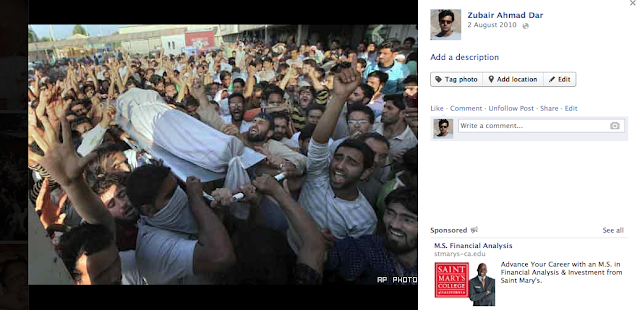
Last week, I went down the timeline on Facebook to check my first post ever. The three words I wrote to describe my feelings read ‘waiting for azadi’. Freedom in Urdu, azadi has come to signify the sum total of aspirations of millions of people in my homeland, Kashmir, a valley perched up in the western Himalayas near India and Pakistan. In my second post, I spell out some of these aspirations as freedom from ‘curfew, atrocities and gags on freedom of speech’.
I vividly remember the days. It was the summer of 2008. We had been constrained indoors for many days in the capital, Srinagar, placed under strict curfew after widespread protests and mass gatherings. As journalists, my friends and I could do little other than make phone calls and surf the Internet for information. Venturing out to gather eyewitness accounts was synonymous with risking your life. Authorities cancelled and reissued curfew passes to us as restrictions continued for weeks. Every day, we would hear of deaths and damages to property by armed forces. Outside the first floor apartment, we would often see troopers thrashing civilians who left their homes to buy bread, milk and other essentials. The gag was choking life in many different ways – crushing dissent, preventing information exchange and breaking the backs of people by limiting access to food and essential medicine.
It was during these strangulating days that I opened a Facebook account. As New Delhi decided to continue the policy of barring text messages and confiscating newspapers, Facebook became the space to express, to communicate, to show and to expose. It was a space that cut through vertical communication structures and established a horizontal network of the people, by the people and for the people. In conflict zones and occupied territories, it proved to be the carnival where people would act vile for a day to challenge the authority of the ruler. But Facebook has since died a death many will mourn for long time to come.
Ever since I landed in the US this summer, Facebook has come to scare me. My home page looks like a psychoanalysis report. It is a reflection of everything I have looked for in the market, searched in Google or bought from an online store. Be it the furniture I like, the boots I am planning to buy, or books of my favourite genre, all make an appearance here – as if winking at me to tell me ‘we know what you did all summer’. Facebook is no longer the space I once knew it to be. It has changed, and so has every website that once inspired me.
It is sad how a democratizing tool like the Internet and social media is continuously becoming a tool for capitalist accumulation. It is painful to accept that we can sometimes be fooled into believing that democracy has breathed a fresh life, for all we witness is a gasp that keeps democracy alive. It can never be confused with the triumph of democracy, with azadi, with freedom.